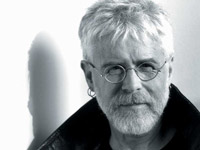Bruce Cockburn: The Truth About Poets

Bruce Cockburn (pronounced Ko-burn) recently released his twenty-fifth CD, Breakfast in New Orleans Dinner in Timbuktu. An inspired lyricist whose style is a soothing blend of folk, rock, and blues, Cockburn is the first to admit that religion is not the focal point of his music. Sadly, his CDs are not sold in most Christian bookstores and a quick listen to one of his songs may not be enough to identify him as a believer. For many Christians, this is a definite strike against him.
We have a tendency to compartmentalize life into the “spiritual” (i.e., important) and the “unspiritual” (i.e., unimportant at best, sinful at worst). While it is certainly vital to discern between what is good and what is not, life shouldn’t be divided into the spiritual and unspiritual, because it is this very distinction that leads some to believe that being a missionary is more important than being a grocer or to assume that a CD found in a Christian bookstore is better or more true than one that’s not.
Scripture tells us that we were created in God’s image and that He called His creation good. If we take these words seriously, we must believe that every aspect of human life is pleasing to God (except for sin). He created us to experience life in all its rich fullness—to talk with one another and with Him, to fall in love and work with our hands, to develop friendships and use our minds, to sing and laugh and cry. If we live as though only a small portion of our existence is spiritual and important, we deny the full humanity in which God created us and we disagree with the Creator who called His handiwork good.
The best poets are able to express in words the very essence of what it means to be fully human. The point is not to distinguish between Christian and non-Christian poets by their use of certain Christian words or themes, but by their truthfulness, their accurate portrayal of what it means to be human.
Bruce Cockburn is a poet of great skill and creativity, who told David Batstone, in a September 1994 Sojourners interview: “It makes no difference whether I write a love song or tell a story about being in a refugee camp. For me it comes from the same place. I just want to touch people. It’s a passing on of my understanding of reality, trying to put it into a form that is interesting and entertaining to somebody else.” Whether his subject is politics, God, despair, or sex, Cockburn is a master of truthfully portraying all aspects of humanity. In “Pacing the Cage” (on his album The Charity of Night), Cockburn sings of depression—something that even the most faithful Christians can experience in a fallen world.
Sometimes you feel like you’ve lived too long
Days drip slowly on the page…
Sometimes the best map will not guide you
You can’t see what’s round the bend
Sometimes the road leads through dark places
Sometimes the darkness is your friend
But he doesn’t end there. For those of us who know God, there is a glimmer of hope even in our darkest hours:
Today these eyes scan bleached-out land
For the coming of the outbound stage
On the same album, Cockburn laments the damage done to humans by humans in “The Mines of Mozambique:”
There’s a wealth of amputation
Waiting in the ground
But no one can remember
Where they put it down
If you’re the child who finds it there
You will rise upon the sound
Of the mines of Mozambique
In his newest album, Breakfast in New Orleans Dinner in Timbuktu, Cockburn continues to address a plethora of issues. You’ll find friendship in “Isn’t That What Friends are For?”
Love’s supposed to heal, but it
Breaks my heart to feel
The pain in your voice –
But you know, it’s all going
Somewhere
And I would crush my heart and
Throw it in the street
If I could pay for your choice
Isn’t that what friends are for?
“Let the Bad Air Out” has an angry undertone over the failure and hypocrisy of politics:
Traitors in high places take my
Money, tell me lies
Take a walk past parliament, it
Smells like something died
They ask for trust, but some-
How I’ve got serious doubts
Open up the window, let the
Bad air out
Often, Cockburn juxtaposes the profound with the ordinary—of drinking champagne while pondering what he would do on the last night of the world (“Last Night of the World”):
I learned as a child not to
Trust in my body
I’ve carried that burden
Through my life
But there’s a day when we all
Have to be pried loose
I’ve seen the flame of hope
Among the hopeless
And that was truly the biggest
Heartbreak of all
That was the straw that broke
Me open
If this were the last night of
The world
What would I do?
What would I do that was
Different
Unless it was champagne
With you?
Perhaps you can understand why Bruce Cockburn is something of a mystery to the Christian community. He doesn’t use his music to “evangelize” and this leads some to devalue his songs and even his witness. But, like the poetry found in the Psalms or the Song of Solomon, Cockburn’s words resonate within our souls because we recognize our world and our own experience in what he says.
I often find myself wondering why this isn’t good enough. After all, isn’t this what we should all be doing? Living every moment before God, developing the skills He has given us, and trusting that we will someday witness “the coming of the outbound stage?”
Source
Cockburn CDs to Check OutBreakfast in New Orleans Dinner in Timbuktu (1999 Rykodisc)
Charity of the Night (1997 Rykodisc)
Dart to the Heart (1994 Sony/Columbia)
Dancing in the Dragon’s Jaws (1979 Sony/Columbia)

